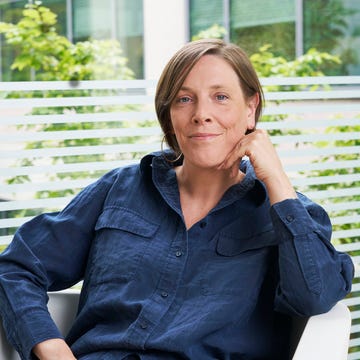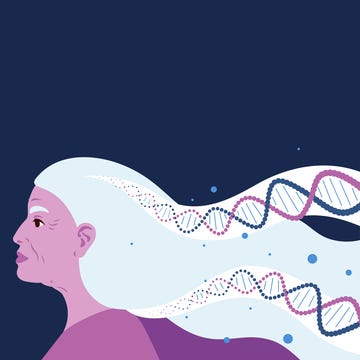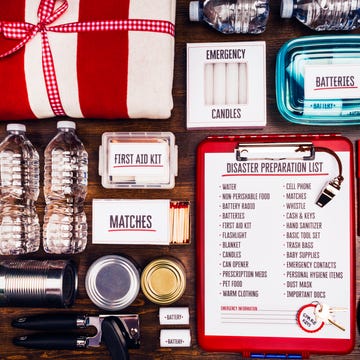It used to be a rare and terrible event to hear that a young person had cancer. A child with leukaemia, a devastating case of breast cancer in a new mother. But follow the news these days, and almost every week there seems to be a new celebrity with the disease - many of them under the age of 50.
Most famously, Katherine, Princess of Wales, completed a course of chemotherapy at the age of 42 for an unspecified cancer. Good Housekeeping columnist and Desert Island Discs presenter, Lauren Laverne announced she was having cancer treatment last summer. And Olympic cyclist Sir Chris Hoy, 48, shared in October that he only has ‘two to four years to live’ due to prostate cancer which has metastasised to his bones. ‘BowelBabe’ Dame Deborah James was 40 when she died of bowel cancer in 2022, and The Wanted singer, Tom Parker, just 33, lost his life to a brain tumour the same year.
We always remember the high-profile cases, but the worrying truth is that cancer in younger people is on the rise in countries across the world. A 2023 paper from the University of Edinburgh found that the global incidence of early-onset cancer had increased by 79 percent between 1990 and 2019. And data from Cancer Research showed that there has been a 52 per cent increase in bowel cancer incidence among adults aged between 25 and 49 since the 1990s, with cases rising faster in England than in the rest of Europe.
So why are younger people getting diagnosed?
While there is no one single cause, scientists believe they may have isolated at least one piece of the puzzle. New research backed by Cancer Research UK suggests that exposure to a particular strain of E. coli bacteria in childhood could be one of the factors driving the increase in rates of bowel cancer in young adults, as it can lead to mutations in the DNA of bowel cells.
A family history is an important consideration; genetically inherited cancers tend to occur earlier in life, such as the aggressive breast and ovarian cancer caused by the BRCA1 mutation, the reason the actress Angelina Jolie opted for a mastectomy and removal of her ovaries in in 2013, when she was just 37.
An improved awareness of cancer symptoms and a desire to get checked out is playing a part in the rise in cases, as are improved diagnostic techniques. But that isn’t the whole story.
The factors which raise your risk
Smoking remains the biggest cause of cancer, but the good news is that we are smoking far less than we used to - according to the World Health Organisation, only one in five adults consume tobacco products in 2024, compared with one in three in 2000 (although more of us are vaping than ever before, and the long term risks to health are still unknown).
Being overweight or obese is also a risk factor - according to the most recent figures from the Office of National Statistics, 64 percent of of adults aged 18 years and over in England are overweight or living with obesity (in 1993, it was just 15 per cent), and a Lancet study found that 10 of the 17 cancers which are on the rise in younger people - such as kidney, ovarian, and pancreatic cancer - are obesity-related. 'Your fat doesn’t just sit there,’ says Cancer Research UK's Rachel Orritt. ‘Fat cells are active, sending signals that make cells divide. They also produce hormones, for example oestrogen, that can increase the risk of breast or womb cancer.’
The attention of many experts globally is becoming increasingly focussed what we eat and drink. In 2023, a team of Harvard researchers found that more than half of cancers on the rise in people under 50 relate to the digestive system. Could this relate to what we eat? Research is just beginning to pinpoint the role of the make-up of the food and its effect on our gut microbiome as a potential trigger for cancer.
‘This is a relatively new science - but we know that the content of your diet can raise your cancer risk,’ says Rachel Orritt. ‘For example, eating too much processed and red meat increases the risk of bowel cancer.’ An increasing body of research suggests that the additives and emulsifiers in UPFs could lead to inflammation and DNA damage, raising the risk of colon cancer. However, hard evidence for this remains relatively limited.
The same goes for the theory that ‘microplastics’ (particles from food wrapping and synthetic textiles) can also raise the risk of bowel cancer. ‘Research is ongoing to understand more about the role of microplastics,’ says Orritt, ‘but realistically, exposure to these chemicals is not on a level to smoking, weight, and the food we eat.
‘Cancer is scary but we are fighting it both as a charity, and as a nation - and there are lifestyle changes we can all make that help reduce the risk.’
What to do now
- If you smoke, stop. This is the most impactful thing you can do, and it’s never too late. Get advice from your GP or a stop smoking service.
- Maintain or reach a healthy weight: Weight affects both your immediate cancer risk and your long-term cancer risk. Start small and make changes that are realistic for you, and sustainable.
- Increase your levels of exercise: staying active can help prevent certain cancers, including breast, prostate, lung, colon, and kidney cancer.
- Protect your skin with an SPF of 30 or higher: Too much direct sun exposure can increase your risk of melanoma and other skin cancers. You can protect your skin by wearing a hat, sunglasses, and broad-spectrum sunscreen with an SPF of 30 or higher, and seeking out shady areas.
- Limit alcohol - see our box, below.
- Make quality sleep a priority: Poor and insufficient sleep can increase your risk of weight gain, which is a cancer risk factor.













